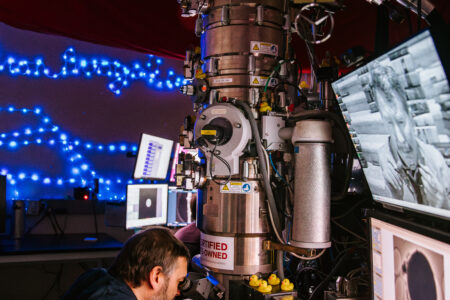
Engineering is going greener. In the UK, companies related to environment, energy and earth have seen their skill diversity grow by over 45%, the “Engineering skills needs – now and into the future,” report found. From 2019 to 2022, job postings for renewable energy engineers skyrocketed 779%.
Engineering graduates with expertise in this field are in hot demand – and it’s easy to understand why. The UK, like many countries around the world, has adopted net zero and sustainability agendas across the economy. The British Energy Security Strategy aims for total decarbonisation of the electricity system by 2035. The food industry, the largest manufacturing sector in the UK, is looking into technological solutions that will reduce the use of pesticides, feed additives that reduce methane emissions from livestock, and more “climate-smart farming” solutions. Even the most polluting of sectors, such as aviation, has set a target of net zero carbon emissions by 2050, with hydrogen seen as a potential alternative fuel.
Do you want to be part of these bold efforts in humanity’s race against climate change? The most prestigious engineering schools have various programmes to help you achieve just that.

Cranfield University’s facilities provide hands-on experience and opportunities for research with real-world applications. Source: Cranfield University
Cranfield University
Engineering at Cranfield University is at the forefront of imagining and delivering a sustainable green planet. Take a quick tour of campus and you’ll not only see the many innovative discoveries taking place here but also the scale on which Cranfield is trying to solve some of the world’s gravest environmental challenges. On one end of the campus lies 3,508 solar panels, which not only provide a renewable energy research facility but produces power equivalent to the energy consumed by 300 houses each year. Over at the HyPER hydrogen plant is a collaboration with industry that examines the potential for low-carbon hydrogen to be the clean fuel of the future. At the plant science laboratory, researchers are inventing technologies to reduce food losses and waste, from farm to fork.
Join Cranfield University and you too can contribute to creating a brighter future for Earth. Professors here believe in the potential of the next generation of leading scientists, engineers and managers to build a new global green economy and have designed a suite of programmes that’ll develop your skills and knowledge to lead the change and make an immediate impact. These include the Environmental Engineering MSc, Autonomous Vehicle Dynamics and Control MSc, and Explosive Ordnance Engineering MSc.
All programmes are industry-relevant and leverage the university’s unrivalled industry links — ensuring every student graduates with in-demand skills. For example, for the CH2i hydrogen technology hub that’s building the pathway to net zero emissions aviation, the research and industry partners who are co-investors for the project include Marshall, Cranfield Aerospace Solutions, GKN Aerospace, AIRBUS, Element 2, Hywaves, Toyota, GTI Energy, Siemens Energy, Heathrow Airport, Modular Clinton Global, and Equilibrion. And that’s not counting all its academic partners, which include the likes of UKRI NERC National Centre for Atmospheric Science and UK Aerospace Research Consortium.
Choosing Cranfield University means being part of this prolific, world-changing research ecosystem. “You’ll be taught by world-leading, research-active academics at the forefront of sustainability-driven research. You’ll have access to near industrial-scale facilities, a campus
urban observatory and a living lab on our beautiful green campus,” says Environment Programme Director Dr. Theresa Mercer. “Our courses are highly applied with extensive collaboration with industry to solve real-world problems and to enhance your future employability prospects.”

ETH Zurich offers a Master’s degree programme in Energy Science and Technology to prepare future engineers for developing sustainable energy systems. Source: ETH Zurich/Facebook
ETH Zurich
Throughout history, humanity’s ability to harness energy has been a defining characteristic. From fire in pre-industrial societies to the complex energy systems of today, our dependence on reliable and sustainable resources is paramount. But how can we ensure an energy future that is environmentally friendly, economically viable, and resilient in the face of challenges?
The Master of Energy Science and Technology (MEST) programme at ETH Zurich tackles these critical questions. This interdisciplinary programme equips students with the knowledge and skills to become leaders in shaping a sustainable energy future.
Offered by a consortium of ETH Zurich departments (coordinated by the Departments of Information Technology & Electrical Engineering (host department) and Mechanical & Process Engineering, in collaboration with the Department of Management, Technology, and Economics and is supported by the Energy Science Centre), MEST provides an extensive curriculum that explores the technical, environmental, economic, societal, and political aspects of energy systems. You can design your own study plan, choosing from a wide range of courses led by 41 tutors from nine different ETH departments who are actively engaged in cutting-edge energy research.
The MEST programme includes lots of practical experience. You’ll have a semester project and an industry internship, ensuring you’re well-prepared to enter the workforce and contribute to real-world solutions. The programme’s success is evident in the achievements of its alumni, including Gianni Hotz.
“During the study programme, I was able to deepen my understanding of the technological, economic and social aspects of these technologies,” he says. “This is of great advantage for my current position as a consultant for companies in the energy sector.”

Technical University of Denmark is at the forefront of sustainable energy research in Europe. Source: Technical University of Denmark/Facebook
Technical University of Denmark
The Technical University of Denmark (DTU) offers a leading education in sustainable energy, ideal for students aiming to be at the forefront of this field. Hailed for its focus on sustainability and business-oriented approach, DTU equips students with the expertise to develop innovative solutions for a greener tomorrow.
Here, you can choose between two specialised master’s programmes: Sustainable Energy Technologies and Sustainable Energy Systems.
The Master’s degree in Sustainable Energy Technologies equips graduates with in-depth knowledge of various renewable energy sources, including bio-fuels, solar power, and wind energy. You’ll learn about energy conversion and storage solutions, gaining skills to develop innovative technologies that accelerate the shift to sustainability. What’s more, you will also investigate strategies for merging multiple energy solutions and include them into existing systems, ensuring a smooth and efficient transition.
The Master’s programme in Sustainable Energy Systems focuses on the holistic understanding and optimisation of large-scale integrated energy infrastructures. You’ll explore interactions between various energy technologies, including power, heat, natural gas, hydrogen, and transportation sectors. The result? You’ll acquire advanced skills in socio-economic analysis, mathematical programming, and cutting-edge methodologies like digitalisation and machine learning. Specialisation options allow you to focus on specific areas like digital energy systems, energy system analysis, and energy-efficient building systems.
The best part? Both programmes are offered as a unique “industry option,” allowing you to fuse work experience with academic study over four years. This flexibility caters to those seeking to bridge theory and practice.
*Some of the institutions featured in this article are commercial partners of Study International










